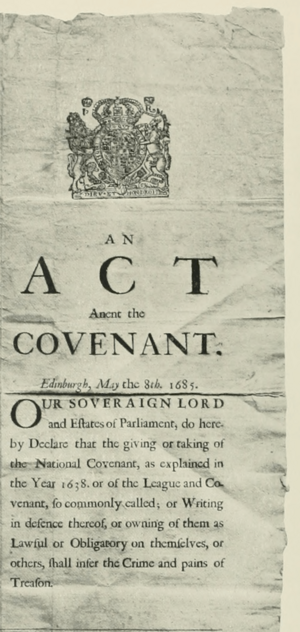Abjuration facts for kids
Abjuration is when someone formally gives up or rejects something important, often by making a serious promise or oath. It's like saying "I officially give this up" or "I no longer believe in this." The word comes from the Latin word abjurare, which means "to swear away."
Contents
Giving Up the Realm
Abjuration of the realm was an old law in England. If someone took this oath, they promised to leave the country right away and never come back. This was often done by people who had found sanctuary (a safe place, usually in a church) after doing something wrong.
The oath was very serious. It meant you had to:
- Leave England and never return unless the King allowed it.
- Travel directly to a specific port.
- Not stop for more than one night in any place.
- Try hard to find a ship to cross the sea as soon as you arrived.
- If you couldn't find a ship, you had to walk into the sea up to your knees every day to show you really wanted to leave.
If you didn't follow these rules, you could be arrested or even executed.
Oaths in England's Past
During the English Civil War in the 1600s, a special promise called the "Oath of Abjuration" was created. This oath was meant to make people reject certain religious beliefs, especially those of the Pope and the Catholic Church.
People who took this oath had to say they didn't believe in things like:
- The Pope's authority over the Church.
- Transubstantiation (a Catholic belief about the bread and wine in communion).
- Purgatory (a place of cleansing after death).
- Worshipping religious images or objects.
- That salvation could be earned by good deeds.
If someone refused to take this oath, they were considered a "Papist" (a Catholic). They could lose most of their property and many of their rights as citizens. This oath was so strict that it made it very hard for Catholics in England to find ways to compromise with the government.
Scotland's Tough Times

In Scotland during the 1680s, a period known as The Killing Time, an Abjuration Oath was used to test people's loyalty. This oath was designed to make Presbyterian Covenanters (a group of Scottish Presbyterians) reject their strong beliefs and allegiances.
If someone refused to swear this oath, they could be immediately killed, even if they didn't have weapons. This was considered a very serious crime, like treason. For example, a man named John Brown was executed in 1685 because he wouldn't take the oath. The families of those who refused could also be forced out of their homes.
Oaths in Great Britain and Ireland
After 1707, in Great Britain, an Oath of Abjuration was taken by important people like Members of Parliament and clergy. This oath made them promise to support the current British monarch and reject the claims of the Stuarts, who were Catholic relatives of the royal family who wanted the throne back.
This oath was used under Kings William III, George I, and George III. Eventually, it was replaced by a simpler oath of allegiance. In Ireland, this oath was also required for many people, including government officials, teachers, lawyers, and even voters.
Bosnian Church's Promise
The Bilino Polje abjuration, also called “Confessio Christianorum bosniensis,” was a promise made by Bosnian religious leaders. On April 8, 1203, seven leaders of the Bosnian Church signed a document at Bilino Polje field, near the town of Zenica in Bosnia and Herzegovina. They promised to give up certain beliefs that were considered heresy (beliefs against official church teachings). This document was later taken to Buda and reviewed by Emeric, King of Hungary, and other important church leaders.
Dutch Independence
Another famous act of abjuration happened in the Low Countries (which is now the Netherlands). On July 26, 1581, they issued the Plakkaat van Verlatinghe. This was their formal declaration of independence from the Spanish King, Philip II. This oath was a major moment in the Eighty Years' War, also known as the Dutch Revolt, where the Dutch fought for their freedom from Spanish rule.
See also
 In Spanish: Abjuración (Inquisición) para niños
In Spanish: Abjuración (Inquisición) para niños
- English post-Reformation oaths
- Papists Act 1716
 | Selma Burke |
 | Pauline Powell Burns |
 | Frederick J. Brown |
 | Robert Blackburn |

